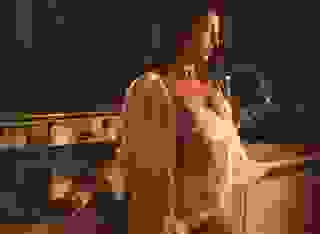- Novels and Novellas
- Varna Ch. 03
Note: You can change font size, font face, and turn on dark mode by clicking the "A" icon tab in the Story Info Box.
You can temporarily switch back to a Classic Literotica® experience during our ongoing public Beta testing. Please consider leaving feedback on issues you experience or suggest improvements.
Click hereVARNA Chapter 3
- "I understand that you have questions." said Rhigen, who had just identified himself as Glasha's father. "Not here, though. Let's go outside."
- "Durgat - my bodyguard - won't like that, unless he can keep an eye on me."
- "The garden, then."
We found a wooden bench in Gerdar Tanle's garden. It was a small place, but fairly private. Durgat could linger by the doorway even while he kept us in sight.
That gave me a moment to think. All I knew of Rhigen was that he was a half-elven musician who had played for my father in Elmina several times over the years. That fact alone made me angry.
- "This is fine." said Rhigen. "Now you can interrogate me. But please keep your voice down."
Interrogate? I didn't care for his attitude. But I had questions, as he'd said, and I wanted to get them out.
- "Does Glasha know?"
- "Of course. As soon as I learned of her birth, I came to see her - and several times thereafter. Once she was old enough to keep a secret, I told her who I was."
- "Why didn't you acknowledge her as your daughter? And why did it have to be a secret?"
- "We kept it secret to protect her. I couldn't bring her to live with my folk; she would not have been accepted. And if your father had learned of her parentage, he would have sent her away." Rhigen didn't seem the least bit apologetic.
- "My father has many half-elves - and half-orcs - in his employ. And why wouldn't your folk have accepted her? Elves don't mistreat half-elves. Half-elves are supposed to be among the most tolerant and most tolerated people in all of Leinyere."
Rhigen's expression didn't change.
- "I'm not an elf, Lord Tauma. Nor am I half-elven."
- "But..." With his fine features and remarkable beauty, I had assumed that he was an elf - that, and the fact that he hadn't changed one iota since the first time I'd seen him. With ears like his, he certainly wasn't human. That only left...
"You're... fey?" I hadn't known that the fey so closely resembled elves - though I learned later that Rhigen used a small glamour - just a little magic - to increase the resemblance and to hide his true nature.
- "I've trusted you with our secret because Glasha assures me that you can keep it safe."
- "I... yes, I can."
- "You stood up to defend her - though she says that it was as much for the principle of the thing as for her alone."
- "You know about that?"
- "It was a popular topic of conversation here for some time. And Glasha herself told me of it when last I saw her, two months ago."
I felt like a fool. Glasha knew her father, but she'd never told me. I hadn't needed to know, I suppose, but I still could have wished that she'd trusted me more. And my first instinct had been to accuse Rhigen of abandoning or neglecting his daughter, when plainly they had been in contact all along, however infrequently.
- "What do you know of the fey, Tauma?" Rhigen asked me.
Now I was embarrassed. I knew what everyone else did: that the fey were innately magical, and that the merest touch of cold iron could sicken and even poison them. They were graceful dancers and incomparable singers and musicians, to the point that even the elves envied them. They were long-lived, but not immortal.
Everything that I knew after that was superstition and ignorant prejudice. There was the old saying: 'Elves can hide, but the fey can disappear'. Missing objects were often blamed on 'thieving fey'. Human females were susceptible to enchantment by male fey; unexpected children sometimes resulted from these unions. Human men were equally vulnerable to the wiles of the fey: men who went missing were sometimes believed to have been beguiled. Missing children were supposed to have been stolen - it was easier to blame the fey for the 'disappearance' of unwanted children.
But now I understood why Rhigen could not have taken Glasha to join his people; they would not take in children of mixed parents. This was not simple racism: a half-fey child was not innately magical in the same way, and could not join a hidden community.
And Rhigen was perfectly right about my father: the vast majority of the people of Elmina would have insisted that he send her away, before she began thieving, or curdling the milk, or preventing pies from rising, or some other such nonsense.
What did I know of the fey? "Not enough." I admitted.
For the first time, I saw the glimmer of a smile on his face - or perhaps it was simply a twitch at the corner of his lips.
- "That's a good start." he said. "It's a little different here. You would expect country folk to be more leery, or even afraid of non-humans. But given the Gerdar's example, they seem to understand that we aren't coming to murder them in their beds. At the very worst, they might be the victims of an innocent prank."
Rhigen stood up. "I shall be here tomorrow, should you wish to talk any more. In the meantime..." He handed me a small package. "She sent you this."
- "Thank you." I got out, remembering my manners only at the last moment.
It was a piece of paper, folded over several times, and tied together with a piece of string. I opened it, and read.
Dear Tauma,
If you've received this, then I hope your first meeting with our mutual friend went well. I also hope that you will forgive me for not sharing our secret until I had his permission. And if I may be allowed one more hope, it's that you will meet and talk some more. I believe that you could learn a great deal from each other.
I've received three of your letters. The last one was the fourth, though - somehow, your third seems to have gone astray. It may yet arrive. I earnestly hope that it does, and that none of your other letters fail to be delivered. It would leave a terrible gap in the story of your travels.
It would also mean that I would have to go many more days without being reminded that you are still thinking of me, just as I think of you every time a bird sings, or a tree speaks to me... or every day, when I wake, and when I lay down to sleep. Sometimes I draw on the aether, and I think of you then, too.
Please keep writing to me. Your letters are a wonderful gift. Keep travelling, so that you see and learn all you can. And then come home to me.
Your Glasha
It was only a short note, compared to the massive quantities of paper and ink that I'd used up over the past months. But those last two words struck me in the heart, like a physical blow. I read it three more times before I folded it up again and tucked it away.
***
I met with Rhigen the next day.
- "Glasha says that you have some talent." he said.
- "I'm trying."
- "You will always be trying, no matter how good you become. You've learned from a practitioner - but that's not necessarily a bad thing."
- "Glasha said that I could learn from you."
- "There's not much that I can teach you in an hour, Tauma. Except this: a strong mind doesn't have to be paired with a weak body - just as a powerful physique need not be paired with a low intellect. Balance is important. You needn't be exceptionally physical or intellectual. There is much to be said for harmony."
I wish that I could have stayed with him for several days - but that would have been to overstay our welcome with Gerdar Tanle. Rhigen promised to come to Elmina again, and to visit with me as well as with his daughter.
- "Thank you." I said. "It has been an honour."
Rhigen actually smiled. "You sound like one of us."
- "I wish that I did."
Hurmas, Sezima and I departed the next day, with Durgat and our guards. I made a point of thanking Gerdar Tanle for her hospitality, and let her know that I had learned a great deal at her house.
- "I hope that one day I can return the favour." I said.
- "Then we have all benefited." she said.
***
We spent another month working our way north, parallel to the river. Here, too, the farms were smaller, the ground stonier. Once we reached the coastal plain, south and west of Whydah, that changed. The land was more fertile, the people more numerous.
We returned to Whydah, where we intended to turn in our horses, so that we could travel by ship. But several surprises awaited us there.
- "Brother!"
My sister Sanatha launched herself at me.
- "Sanatha!" shouted my mother. "Behave yourself! Is this how you act in public?"
I chose to ignore my mother. It wasn't all that difficult, with my sister draped all over me. "Did you miss me?" she asked.
- "What are you doing here?"
- "I haven't seen you in a year, and that's all you can think to say to me?" She pouted. "Hello dear sister - how wonderful to see you again! What about something like that?"
I had to laugh. "It is wonderful. But my original question still stands."
- "I'm doing a tour of my own. And I'm going to Portoa with you!"
- "Not if I withdraw my permission!" growled our mother. "And seeing the way you comport yourself in public, I am having second thoughts."
That was my mother: she would scowl and upbraid us in front of complete strangers - yet it was our behaviour which was at fault.
- "Tell you more later." whispered Sanatha, giving my hand a squeeze.
She then went on to placate my mother, making a show of remorse and obedience (which I could not have done). Uncle Esin uttered a few soothing phrases, and the maternal tantrum finally subsided - for now.
Only then could my friends be presented. Everyone collaborated to pretend that they hadn't been forced to witness the whole sorry display.
It was some time later before Sanatha and I could finally have a private conversation.
- "You're coming with me to Portoa? San - what's going on?""
- "First things first." My sister handed me a short letter. It was from my father. In short, clipped sentences, he informed me that I was to take my sister along when I went to Portoa. Included with that was a list of prominent Portoans we were to visit. All I had to do was follow instructions, he informed me. In other words, even a disappointment like me couldn't mess this up.
But I couldn't vent my anger against our sire; Sanatha looked too happy. I wasn't about to spoil this grand adventure for her.
- "That's wonderful." I said. "No wonder you're so excited. But how did you ever get him to agree to this?"
- "Read this one, next. Then maybe you'll understand."
The second letter Sanatha handed to me was from my brother Aludar. It was a little more formal than usual, but that was because of the matter it dealt with.
My brother was married. Her name was Visca Mainyul, and she was the daughter of a prominent family of Portoa. My father hadn't even thought to inform me that my brother was getting married. It was obviously unnecessary for me to be present.
- "She's shy, of course," said Sanatha, "and quite intimidated around Papa - who wouldn't be? But she's really quite sweet. And... well, it's not a secret: she's already pregnant!"
- "You like her?"
- "Of course I do. I told you: Visca is shy and sweet, and she thinks that her new husband is the kindest, most intelligent man in all of Varna. Aludar is very happy."
- "That's good." I said. Even as I said it, I made the connection to my sister's travels. "Is that why he's letting you go to Portoa? To find a rich husband?"
Sanatha grinned. "There's my smart little brother."
- "I'm older than you, San. That makes me your big brother."
- "Except that I have three bigger brothers, which makes you littler. See? And we're not just going to Portoa to let possible suitors gawk at me. They're going to see you, too. Father was quite impressed with the size of little Visca's dowry. Another one like that, and he can cover the cost of my dowry - and still make a profit."
That was my sister. Sanatha knew what Father was like, just as I did. But where I was angry, and offended, she chose to make a joke of the whole thing.
"Don't worry, Tauma. We don't have to come home with marriage contracts, signed and sealed. I plan on picking my nose at every opportunity, and I'm working on a truly hideous laugh that should repel just about anyone. You can just scowl and be yourself - although loud farts from time to time couldn't hurt. I know you have it in you."
My sister was truly one of a kind. She could sense my anger, and chose to meet it with humour. But there was good sense in her foolery: we didn't have to go along with Father's plans. And this was probably going to be her only chance to see a bit of the world, and to have an adventure. I wasn't going to spoil it for her.
- "I'll have to practice farting around you - until I get it right."
Sanatha actually smiled. "Cabbage." she said. "That should do the trick. Oh - I have one more letter for you. She was most insistent."
It was short, and quite simple.
You probably know how much I miss you. It's not always easy, being the one who stays in one place, while you travel, see new things, and meet new people.
I know that you would have travelled to Portoa in any case. I also understand why your father wants you and your sister to go there. So I will say this now: if you must marry, then so be it. You will have to do it one day in any case.
It won't change a thing about the way I feel for you. And if you can keep it separate from how you feel about me, then I will be satisfied with that. Go where you will, do what you must. Whatever you decide, I'll be here when you return.
Your Glasha
Sanatha saw the first tear from my eye splash upon the page I held in my hands. She didn't say a word, but quietly left me alone.
***
As luck would have it, Captain Urbo was in Whydah harbour, and prepared to take us on. He was willing to surrender his own cabin to Sanatha and me (Father's instructions had made it clear that I was never to let my sister out of my sight - not even for an instant). Durgat slept on the deck, just outside our door. Urbo also forced his mates out of their accommodations to make space for Hurmas and Sezima, and for Sanatha's maids.
Captain Urbo was no fool. I would have paid a fair price for passage. But the Duke himself was paying for his only daughter's voyage, along with my guards, Sanatha's guards, and her female attendants. Urbo stood to make a killing with this trip, in terms of money, reputation, and a connection with the Duke and his family. All that - and he could still carry a cargo to sell in Portoa.
Sanatha was delighted with everything. She liked Hurmas (immediately) and Sezima (somewhat later). She felt perfectly safe with Durgat and me nearby. She was enormously entertained by Captain Urbo and his tales.
We enjoyed very good weather, and rounded the Northwestern Capes without difficulty. When we began to sail south, hugging the coast, I saw what Hurmas had been talking about.
As far as the eye could see, there were trees. The forest was like a great sea, vast and mysterious. What lay beneath the treetops? Sanatha was equally impressed.
Over the next few days, we had several opportunities to converse with Captain Urbo. It was Sanatha who asked him if his father had been a sailor as well.
- "No, lady. He was a farmer."
- "Really? How did you come to be a Captain, then?"
Urbo hesitated - an unusual reaction from him.
- "I'm not certain that it's a tale fit for... present company." said Urbo.
- "Too delicate for a lady's ears?" said Sanatha.
- "No, Lady. I meant for Gerdar, and for the children of the Duke."
- "Well, now we have to hear it." said my sister.
- "I'm curious, even if no one else is." said Sezima.
- "Are you afraid that we be offended, Captain?" asked Hurmas. "Does this tale reflect poorly on noblemen?"
Urbo inclined his head. I realized that he would never have said as much as he had if he didn't truly wish to tell the story. He had us all intrigued, now.
- "Does your story involve a member of one of our families?" I asked.
- "No, Lord Tauma."
- "Then it's your choice if you wish to share it with us, Captain. I doubt that we'll be offended. We can also promise not to repeat it, if that helps."
- "Very well." said Urbo. "My father was a peasant farmer on the lands of a Tir - who shall remain nameless. This was far from Whydah, though I will not say in which direction. He held a modest property, which was more than enough to support us all. Now, this Tir - like many others in Varna - kept granaries. In times of plenty, he bought additional grain, and stored it. Do you know why?"
- "To feed the people when there was a shortage." said Sanatha. "Although... I'm beginning to guess that he had a different purpose."
- "That's right. In times of shortage, he hoarded the grain - until the price had risen dramatically. Only then would he sell it, at inflated prices."
- "To his own people?"
- "Exactly. My father had to sell a piece of his land, to be able to afford grain. Many others were not so lucky. Some had to sell their livestock."
- "This used to happen in the Time of the Kings." I said. Aludar had shared an account of such practices with me.
- "It still happens, Lord." said Urbo. "We had alternating years: one good, one bad, then one good, and two bad. The Tir charged more and more for his hoarded grain. He let a few families starve, to show us all that he would not be moved by his people's suffering. By that time, very few of the farmers had anything of value left, other than their land. The Tir bought their land with exorbitantly priced grain. Then he charged them rent for the privilege of living and working on their own land. The next time there was a shortage, and they couldn't pay their rent, the Tir demanded that they sign contracts, agreeing to work for him - building a bridge, repairing the road, building him a dovecote, or agreeing to grind their grain at his mill - and only there."
- "For a fee?" asked Sezima.
- "Of course."
- "Did no one protest?" asked Sanatha.
I spoke before Urbo could answer her. "There was a rebellion. An uprising." I said.
- "When was this?" asked Sanatha. "I don't remember any rebellion."
- "You were only two years old, San."
- "How do you know of it, then? You were only 5!"
- "Aludar told me all about it. There was a delegation sent to Elmina, since the Tir wouldn't listen to them. Father sent them away. He said that the Tir was well within his rights. That's when the uprising occurred."
- "You are well-informed, Lord." said Urbo.
- "What happened to your father? To your family?" asked Sezima.
- "My father... chose to join the uprising. He died fighting; he was not among the 30 men who were captured and hanged, their remaining property confiscated. My mother died within the year. My sister and I took to the road. We ended up in Whydah."
- "Where is she now? Your sister, I mean."
- "She runs a respectable brothel in Whydah. I doubt that you young gentlemen are familiar with it. She sold herself to advance my career; when I prospered, I was able to help her buy her own establishment."
We were all silent for a few moments.
- "I'm so sorry." said Sanatha.
- "It was hardly your fault, Lady."
- "No, but... this Tir - my father... you must hate us."
- "Tir Beksha died three years ago. As for your father, he would've had to be an incredible champion of the people to have intervened in our favour. I bear his children no ill will. That would be unfair. You had no part in it."
Urbo excused himself, and left us alone.
Once again, we were silent for a time. It was Sezima who spoke first.
- "I feel... soiled, somehow."
- "That's a good word for it." agreed Hurmas. "It wasn't us, of course. But our class..."








